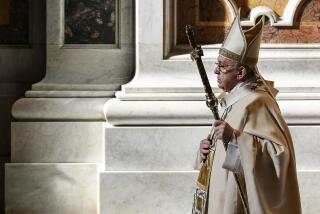Reconciling Our Beliefs With Reason
- Share via
Although I am not a Catholic, I believe we should all commend Pope John Paul II for his recent encyclical titled “Faith and Reason.” For most of two millenniums the Catholic Church has survived and flourished in the midst of great social, political and economic change in the Western world. The reason is that the church over the centuries has accommodated change while still adhering to the fundamental tenets of its faith (although it was a tad slow in accepting Galileo’s view of the solar system).
Now, the church seeks to bridge what the pope sees as the “fateful separation” of faith and reason--concepts that, to some, seem to be ever more incompatible with each passing decade as the exponential growth of science and our understanding of the workings of the natural world challenge the tenets of faith.
The pope’s decision to face this apparent dichotomy head-on is commendable. To this reader the pope’s conclusion is that faith and reason can exist side by side, and that reason strengthens faith. At the risk of getting a little philosophical--and over my head--the encyclical, issued last fall, triggered a few thoughts.
In my view, faith and reason have always existed side by side. Faith, being something taken as true but without proof, embraced things we accept every day of our lives. Like when we cruise through green lights at intersections and have faith that no one will run the red and crash into us. Or like our faith that the pharmacist will fill our prescription with the right pills. These are reasonable faiths--not assured, but reasonable.
Similarly, we subject our thoughts and actions to reason, defined by Webster as “the power of comprehending, inferring or thinking in orderly rational ways.” We try to think and act in “orderly rational ways” as much as we can. So faith and reason, as the pope suggests, are not incompatible because both are integral parts of our lives.
The problem is that some extremists think that faith and reason are incompatible, especially in light of the rapid growth of science and the scientific method over the last hundred or so years. The advances of science are casting more and more doubt on some of the time-honored tenets of religious faith.
The scientifically inclined contend that in biblical times people had faith in things they had no way of proving, but did the best they could with limited facts during what some call our “racial childhood.” And now, with expanding knowledge of how the universe and nature work, some say we should renounce certain faiths that have proved to be wrong.
How can we resolve this dilemma? One way is to use our reason to distinguish between two kinds of faith: rational faith and blind faith.
If we use our reason to make this distinction we can begin to accommodate to the realities that science is showing us with each passing year, and we can begin to adjust faith to reason.
The Roman Catholic Church, through its latest encyclical, has taken a first, modest step along this path. As the pope says, “It is the nature of the human being to seek the truth. . . . The lesson of history in this millennium now drawing to a close shows that this is the path to follow: It is necessary not to abandon the passion, the eagerness to search for it [truth] or the audacity to forge new paths in the search.”
The question is: Will the church continue along the path of seeking truth through reason so that we do not continue to hold opposing “truths” in logic-tight compartments in our heads--the “truths” we accept on Sundays and opposing “truths” we accept during the rest of the week based on scientific evidence?
Let us hope the encyclical “Faith and Reason” will be a step in the direction of verifying the indivisibility of truth. And let us hope that in the end, blind faith is subjected to examination and faith based on reason prevails.
*
On Faith is a forum for Orange County clergy and others to offer their views on religious topics of general interest. Submissions, which will be published at the discretion of The Times and are subject to editing, should be delivered to Orange County religion page editor Jack Robinson.






